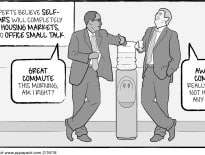Before autonomous vehicles and mobility as a service can become mainstream, complementary businesses will need to become robust enough to support early adopters and grow with the industry. This autonomous vehicle ecosystem is critical for the overall success of mass adoption. While many are focused on the technological innovations that are occurring in the autonomous vehicle space, a wide range of logistics, financial and workforce issues must be simultaneously addressed. New business models will be created, and new revenue and sales streams will become dominant. Our economy will be disrupted again.
Once autonomous vehicles begin to be mass marketed, consumers will need to be confident that all of the support services that make mobility as a service feasible will simultaneously be available. For instance, the mobility as a service movement is expected to be largely dominated by electric vehicles. While the early launches of autonomous vehicles will be hybrids, the real savings that allow mobility as a service to be economically competitive can only be realized when the internal combustion engine is eliminated from our automobile fleets. This results in two major ecosystem issues.
First, fleets of new autonomous electric vehicles will need places where they can go to charge, be cleaned, maintained and monitored for performance. These autonomous vehicle depots will be large and will include a wide array of services needed to keep these fleets moving. Some expect these facilities to evolve from today’s urban parking garages. Others expect them to evolve from massive suburban parking lots that are underutilized and no longer needed for parking in an autonomous world. Whichever outcome prevails, these facilities will need to undergo a complete transformation to make them viable.
These new facilities will provide the real estate industry with a new type of land use to develop and market. In addition, these facilities will require a substantially different utility service, including adequate power and water supplies to support an autonomous fleet. These facilities will also require a very high degree of connectivity to support robust, real time analytics and security for the operation of such a significant portion of the automobile world.
In addition to the real estate and logistical aspects of this evolution, there are very real labor dislocation issues. Gas stations, automobile mechanics, body shops, car dealerships and many more job categories will be impacted by this market disruption. For instance, many expect the traditional automobile dealership to disappear in favor of mall stores or similarly smaller footprints, where consumers will go to sign up for mobility as a service, much like they sign up for mobile phone service today. This will have a major impact on car dealerships as we know them today.
Creation to Demolition Services
As mobility as a service evolves, it is expected that the service providers will ultimately take over the entire process of keeping a fleet in motion. This will include owning the vehicle, maintaining the vehicle, fueling the vehicle, insuring the vehicle, marketing the vehicle and retiring the vehicle. Cradle to grave. It is expected that Ford, GM, Waymo, Lyft, Uber and others will all provide this full range of services. As a result, many traditional businesses will be dramatically impacted. Beyond the impacts to automobile dealerships’ maintenance departments, where hundreds of mechanics are currently employed, we must think about the hundreds of auto body employees, gas station attendants, automobile insurance agents and brokers and rental car company employees. These job categories will all be disrupted in the coming decade.
One of the services that is expected to blossom in the new autonomous vehicle economy is fleet maintenance. Expect to see new firms emerge to manage fleets in the new autonomous vehicle hubs. New firms will maintain, clean and manage these vehicles for the major mobility hubs. Not to be outdone by the autonomous vehicles themselves, these facilities will be technologically advanced and very profitable businesses.
The coming age of mobility as a service will present society with a wide range of very disruptive options and choices. With those choices, society will unconsciously be making decisions about an unimaginable new stream of businesses and markets. These new businesses represent a tremendous opportunity to those forward-looking entrepreneurs who can clearly see the future and position themselves for these opportunities. Those who cannot or will not evolve will face difficult choices and may be driven out of business. The future of the autonomous vehicle industry will demand change, and business must rise to meet this challenge.
William F. Lyons Jr. is president and CEO of the Fort Hill Cos.




 |
| 

